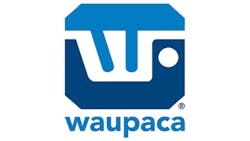Waupaca Foundry Sold to Hitachi Metals for $1.3 Billion
Waupaca Foundry Inc. will be acquired by Hitachi Metals Ltd. according to a sale agreement, in a deal expected to close later this year. The seller is the private-equity group KPS Capital Partners LP, which purchased the gray and ductile iron metalcasting group from ThyssenKrupp AG in June 2012.
According to the buyer’s statement, the value of the purchase is $1.3 billion.
Waupaca Foundry employs 3,900 people at six foundries: three in Waupaca, WI, and one in Marinette, WI; another in Tell City, IN; and one Etowah, TN. It produces gray, ductile, compacted graphite and austempered ductile iron castings for manufacturers in the automotive, commercial vehicle, agriculture, construction, and other industrial markets.
Hitachi Metals — which is a portfolio of companies that manufacture various metal products and materials, magnetic materials, finished components and equipment, as well as wire and cable — stated it plans to enhance its iron casting business and medium‐ to long‐term global expansion through this transaction.
“The iron casting business has been a focus for many years, particularly in the automotive market,” according to a Hitachi Metals summary statement. “In high-grade ductile iron casting and other categories, we have been strengthening our global capacity through the construction of new production facilities in Japan, Korea and the United States as well as the acquisition of our Indian automotive casting subsidiary in April, 2014. We are expanding our business and building a foundation for future growth.”
Waupaca Foundry officials were unavailable for comment. However, president and CEO Gary Gigante stated: “This investment by Hitachi Metals in Waupaca Foundry’s world-class facilities and capabilities is a validation of what we have accomplished over the past two years and signals a strong commitment to manufacturing and the foundry industry in the United States.
“Partnering with Hitachi Metals will bring Waupaca Foundry significant global strength that will help us drive continued expansion.” Gigante continued. “We share Hitachi’s vision for the future of our business in the United States and its many growth opportunities in global markets. Our new partnership with Hitachi Metals will present great opportunities for our employees, customers, and suppliers, and we anticipate a seamless transition.
Gigante acknowledged the ownership of KPS over the past two years, noting the foundry group’s standing as a “world-class manufacturing company grounded in a culture of continuous improvement,” and thanked the departing ownership for its leadership and contributions.
About the Author
Robert Brooks
Content Director
Robert Brooks has been a business-to-business reporter, writer, editor, and columnist for more than 20 years, specializing in the primary metal and basic manufacturing industries. His work has covered a wide range of topics, including process technology, resource development, material selection, product design, workforce development, and industrial market strategies, among others.
